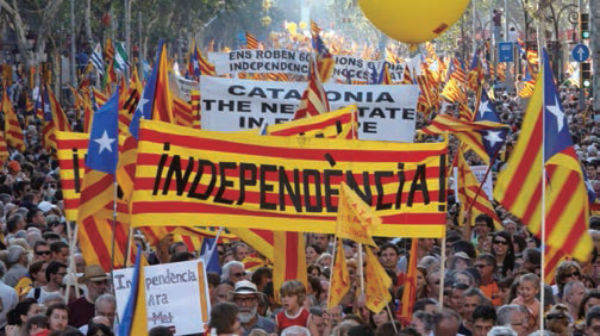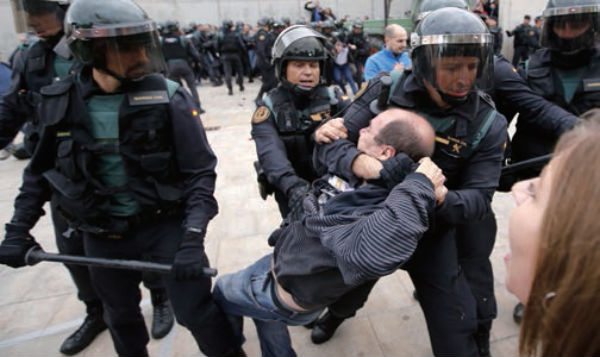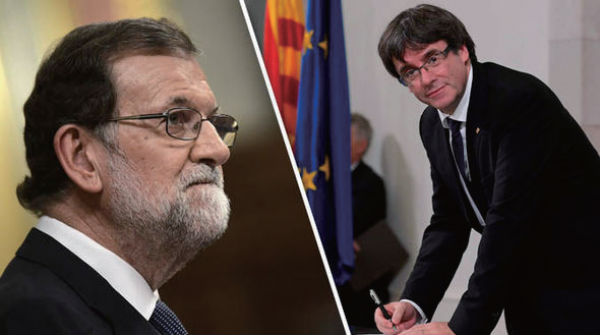On October 1st, 2017, FC Barcelona’s league match against Las Palmas took place in
Camp Nou, the home stadium of FC Barcelona, but was oddly played without any
spectators. The reason why the game was played behind closed doors is that the 2017 Catalan Independence referendum took place in the Catalan regions including Barcelona on the same day. The conflict between Spanish policemen and Catalan citizens caused bloodshed, and FC Barcelona requested Liga de Fútbol Profesional (LFP, National Professional Football League) to postpone the league match, but the LFP declined their request. Eventually, for safety reasons, the match on October 1st was played behind closed doors. The Sungkyun Times (SKT) now examines Catalonia, the region that caused not only the match to be played behind closed doors, but also itself to be left in bloodshed, why the region longs for independence, the 2017 Catalan Independence referendum and its problems, and its implications and what could happen next.
Catalan Independence Movement
What Is Catalonia?
Catalonia
Country: Spain
Location: East of the Iberian Peninsula
Provinces: Barcelona, Girona, Lleida, Tarragona
Area: 32,108km2 (6th in Spain)
Population (2016): 7,522,596 (2nd in Spain)
Official Language: Catalan, Occitan (Aranese), Spanish, Catalan Sign Language
Total GDP (nominal, 2012): $255,204 billion (20% of Spain’s total GDP)
GDP per capita (nominal, 2012): $33,580
Why Catalonia Seeks Independence
Historical Reasons
The Catalan independence claim is attributed to the fact that Catalonia had an independent identity before the formation of the Spanish kingdom after the collapse of the Roman Empire and the Visigothic Kingdom. Catalonia, unlike Castile and Portugal, other regions that originated from Asturias, originated from the Kingdom of the Franks. Since Spain was founded through the marriage alliance of two sovereign states, the Kingdom of Castile and the Kingdom of Aragon, the Catalans have different identities distinct from the Castilians. Catalonia also has an independent language, Catalan, and more than 50% of all Catalans use it.
Economic Reasons
Though Catalans claim that historical and ethnic differences are the basis for their independence claim, those differences are indeed superficial reasons to justify their independence. Fundamentally, they want independence for economic reasons. Currently, Catalans are dissatisfied with the Spanish government's tax collection and distribution system. First of all, the amount of tax collected by the Spanish government is higher than the amount distributed to Catalonia. According to the British Broadcasting Corporation (BBC), in 2014, Catalonia paid €9.98 billion, which is about ₩13 trillion, more than it received from the government; €9.98 billion amounts to 5% of the Catalan Gross Domestic Product (GDP). Secondly, national investment in Catalonia has plummeted. In 2003, the government allocated nearly 16% of the budget to Catalonia, but in 2015, the government only allocated 9.5%. Lastly, Catalonia has a tax system different from the Basque community. Basque is the richest community in Spain and had also been vocal about independence just like Catalonia. After the Basques made treaties with the Spanish government to have each province levy taxes on local jurisdictions and pay some of them to the Spanish government, their independence movement seized. On the other hand, other communities including Catalonia have a system in which the Spanish government collects taxes directly from the communities and distributes them to each community. The Catalan government wants to have autonomy of finances just like the Basque government. Due to these three reasons, the Catalan government and its people are upset and have an ever-deepening hatred toward the Spanish government.

2017 Catalan Independence Referendum
How They Got Here
Before the Spanish Civil War: Catalonia enjoyed its wide autonomy.
1939-1975: Catalonia was suppressed under Francisco Franco’s Dictatorship.
1978: The Statute of Autonomy of Catalonia was founded under the Spanish Constitution of 1978.
2006: New statute of autonomy was approved by referendum on June 18th, 2006, which guaranteed wider autonomy.
2010: The Spanish Constitutional Court overruled the 2006 statute of autonomy.
2012: Prime Minister Mariano Rajoy declined the Catalan government’s request to reduce taxes that it pays to the Spanish government.
November 2014: The Catalans angered by several years of economic decline, reduction in allocated taxes, and reduction in autonomy held an unofficial independence referendum.
2015: Separatists won regional elections in Catalonia and examined holding a legally binding referendum.
September 6, 2017: The Council of Catalonia passed a bill to hold a referendum on independence.
September 7, 2017: The Spanish Constitutional Court ruled that the referendum is unconstitutional.
September 19, 2017: The Spanish government virtually confiscated expenditure authority from Catalonia by approving the executive order to halt the payment of additional grants to Catalonia and to expand the authority to oversee the fiscal spending of the government.
September 24, 2017: The Spanish government announced that it would halt the referendum, if necessary, by force.
October 1, 2017: The Catalan Independence referendum took place despite the interference of the government.
October 2, 2017: 90% of the Catalans who voted agreed to independence, and only 8% of the Catalans who voted opposed it. Meanwhile, the turnout was 42.34%.
Problems with the Referendum
Catalonia
The Catalan government’s enforcement of the referendum can be criticized in two ways: from a legal aspect and from a political aspect. First of all, legally speaking, Catalonia has no right to declare independence although the Catalan government revealed that it would peacefully proceed with its independence process. According to the current Spanish Constitution, communities cannot hold a referendum and declare independence on their own without the Spanish government’s consent. For this reason, the Spanish government ruled the Catalan government’s decision unconstitutional. Since the bill was found unconstitutional, the referendum and declaration of independence are also illegal. Though the Catalan government acknowledges that it does not have any right either to hold a referendum or to declare independence, it is being obstinate and insists on asking for
the acceptance of the referendum. Secondly, the separatists in Catalonia hid their administrative faults and instigated people to be vocal about the independence. Although the whole nation’s economy got worse after 2008, the separatists in Catalonia blamed and incited hatred toward the Spanish government for the economic decline.
The Spanish Government
Though it seems that Catalonia is the one that initiated the referendum, the Spanish government is also accountable for it. First of all, Catalans have hostility toward the central government because Catalonia has been suffering from discriminations by the government for centuries. Under the dictatorship of Francisco Franco from 1939 to 1975, the language, culture, and government of Catalonia were suppressed because Franco focused on consolidating the power of the central government. Though Catalonia pays more taxes than most of the communities of Spain, the Spanish government helps other communities or invests taxes to develop Castile, where the central government is located. In 2016, Catalans became more upset because it was revealed that the central government tried to change the flow of a river that originally flowed into the central region of Catalonia to the southern region of Andalusia without the consent of Catalans. Not only that, the central government's excessive suppression before and on the day of the referendum provoked people’s anger. The police force was called in to stop the referendum, and the central government announced that there were not any problems in halting the referendum since it already declared the referendum as illegal. The problem was that even though Catalans did not protest severly, Spanish policemen ruthlessly used violence, even on defenseless Catalan civilians who just simply voted. The violence of the Spanish policemen was not reported by local media, but became known to the world through the British daily newspaper The Guardian.

What Would Happen Next?
Possibilities of Achieving Independence
The possibility of Catalonia becoming independent in a short period of time is close to zero because the Spanish Constitutional Court has ruled that the ballot itself is illegal. In addition, there is no domestic or international law clause to support the independence of Catalonia, and what Catalonia really longs for is the autonomy of finances, not independence. On October 10th, Carles Puigdemont, the current president of the government of Catalonia, revealed that he would halt the independence process and have a conversation with the central government, but Prime Minister Mariano Rajoy rejected the offer. It is speculated that the Spanish government will impose Article 155 of the Constitution to suppress Catalonia’s autonomous government when it declares independence. Article 155 states that the government can suppress insubordinate autonomous governments by any means. It is highly likely that the central government will severely punish those who were involved in the process of holding the referendum once the independence process stops. Even if Catalonia somehow achieves independence, Catalonia will continue to struggle. It will have to endure huge economic losses considering that it will not be able to enter the European Union (EU) since Spain will definitely oppose accepting Catalonia into the EU. Whatever happens, the Catalan government is stuck.

Comparison with Other Regions Around the World That Also Seeking Independence
There are many regions around the world that are presently seeking independence. Flanders in Belgium and the Chechen Republic in Russia are regions that also seek independence just like Catalonia, and those two regions and Catalonia have many things in common. First of all, Flanders and Chechnya use different languages from the countries that they belong to. Flanders uses Dutch, while most regions in Belgium use French. Chechnya uses Chechen, while most regions in Russia use Russian. Secondly, the two regions want independence fundamentally for economic reasons. People in Flanders hate the fact that the money they earn is used to help the people of Wallonia, another region of Belgium, that is in economic decline. The transport profits from the oil pipeline passing through Chechnya are enormous, so neither Chechnya nor Russia are holding back. Lastly, both regions have ethnicities and cultures distinct from the countries they are part of. Flanders and Wallonia have never shared the same identity, and Flanders hates Wallonia for its discrimination on Flanders in the 20th century. Chechens are ethnically different from Russians, and Chechnya has a unique history along with traditions which are based on Islam.
The 2017 Catalan independence referendum took place, and both the central government and the Catalan government are holding grudges. The Catalan government declared independence, and the central government confiscated autonomy from the Catalan government. No one knows where the 2017 Catalan Independence referendum incident is heading. However it ends up, it will have a significant influence on other regions that long for independence. Therefore, there is a growing concern among the international community that the political and social conflicts in Europe and of the world will become more prevalent. It will be interesting to see how the Catalan independence referendum incident ends and how much impact it will have on the world.
